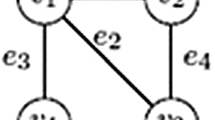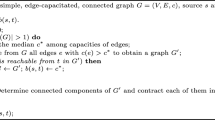Abstract
We study the average number of delays suffered by packets routed using greedy (work conserving) scheduling policies. We obtain tight bounds on the worst-case average number of delays in a few cases as follows. First, we show that the worst-case average number of delays is a function of the number of sources of packets, which is interesting in case a node may send many packets. Then, using a new concept we call delay race , we prove a tight bound on the average number of delays in a leveled graph. Finally, using delay races in a more involved way, we prove nearly tight bounds on the average number of delays in directed acyclic graphs (DAGs). The upper bound for DAGs is expressed in terms of the underlying topology, and as a result it holds for any acyclic set of routes, even if they are not shortest paths. The lower bound for DAGs, on the other hand, holds even for shortest paths routes.
Similar content being viewed by others
Author information
Authors and Affiliations
Rights and permissions
About this article
Cite this article
Lotker, Z., Patt-Shamir, B. Average-Case Analysis of Greedy Packet Scheduling . Theory Comput. Systems 35, 667–683 (2002). https://doi.org/10.1007/s00224-002-1095-x
Published:
Issue Date:
DOI: https://doi.org/10.1007/s00224-002-1095-x




